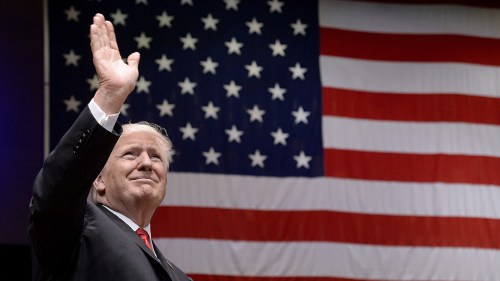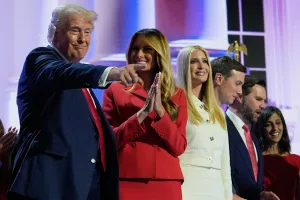GOP challengers face make-or-break moment in third debate
The third Republican presidential debate in Miami next month could be one of the last major opportunities for some candidates to make their case to the GOP base before voting kicks off in January.
Amid what many see as a scramble for second place behind front-runner former President Trump, the debate presents a high-profile opportunity to reach a big audience ahead of the Iowa caucuses, and it could be a make-or-break moment for candidates who have so far struggled to gain traction.
The White House hopefuls will first need to meet the third debate’s heightened qualification requirements to get on the stage — and then capture attention and momentum from the podium.
“This debate is very important for the candidates that are teetering on the brink of irrelevance,” said GOP strategist Brian Darling.
“If a candidate’s not on the debate stage, they should probably hang up the cleats and call it a day,” Darling said. “And if a candidate does not move the needle significantly in the next debate, it’s going to be hard for them to make any credible case that they have a chance to be the nominee.”
Florida Gov. Ron DeSantis, former South Carolina Gov. Nikki Haley, entrepreneur Vivek Ramaswamy and former New Jersey Gov. Chris Christie appear to have met the Republican National Committee’s (RNC) polling and donor requirements for the Miami stage, according to their campaigns.
DeSantis has long been considered the closest GOP challenger to Trump, and Haley has gained recent traction, threatening DeSantis for that second-place slot. Strategists pointed to the pair as likely standouts at the next debate as they jostle to close the gap with Trump.
Trump’s former Vice President Mike Pence, North Dakota Gov. Doug Burgum and South Carolina Sen. Tim Scott, who were on the second debate stage last month, have until Nov. 6 to make the cut.
“If you’re not able to qualify for the debate, weeks before the Iowa caucuses, you need to consider the state of your candidacy,” said GOP strategist Alex Conant. “If you’re not on the debate stage, unless you’re Donald Trump, you’re not running for president.”
The Miami debate will be a key opportunity for more prominent candidates — such as DeSantis and Haley — to build on their support, strategists said, but it may be even more crucial for candidates who have been struggling to move the needle — such as Pence or Burgum.
“The debates are the only time when the trajectory of the race could change. The only time when voters are tuned in, when you have a lot of media coverage, and can rise or fall,” Conant said, pointing to Haley’s notable boost after her previous debate performance as an example.
Ramaswamy, despite appearing to qualify, has said he might skip the event, and he said this week that he expects a strong showing in Iowa. He would join Trump in declining to participate: The front-runner passed on the first two debates and plans to hold a rally in Florida as counterprogramming on the night of the third.
The Nov. 8 debate comes just over nine weeks before the Iowa caucuses, the first election in the GOP nominating process, set for Jan. 15, 2024. The debates so far have been set roughly five and six weeks apart, and the RNC hasn’t yet announced plans for an additional debate in the 2023 calendar.
“Unless they plan something [in] early January … this will be a last chance for these candidates to speak to an audience of roughly 10 million people,” said Justin Sayfie, a Florida-based Republican strategist. “So it’s a unique opportunity before the Iowa caucus.”
Previous presidential election cycles have seen debates scheduled for December and early January — but this year’s process has been “really accelerated,” with fewer and less frequent debates so far than the 2016 election, said Aaron Kall, an expert on presidential debates and the director of debate for the University of Michigan Debate Program.
“There just hasn’t been a lot of transparency this time, and a lot of rumors,” Kall said, pointing to earlier speculation that the third debate would be held in Alabama, as well as questions about the RNC’s debate qualification criteria. He attributed the more “chaotic” rollout this year in part to the unique circumstances of a former president running as the party front-runner — and not participating in the debate.
As the holiday season approaches, voters might “tune out” of campaign news, he said, making the Miami debate “maybe the last opportunity,” given this year’s spacing out of the debate schedule, to capture significant attention before next year.
There are likely plans for additional debates in and around early voting states, Kall noted, but “there may not be many more opportunities left for the candidates before the voting starts.” In 2016, GOP candidates held a seventh debate in Iowa just days before the caucuses.
The spread-out debate schedule during this cycle might also be making it more difficult for candidates to gain momentum from their performances when they do make the stage, Kall said.
“They have a good performance, and then there’s not another one for five weeks — it kind of decreases the attention and doesn’t allow them to get in a rhythm.”
Pence acknowledged last week that his campaign has an “uphill climb” for the Republican nomination. His campaign raised around $3.3 million in the third fundraising quarter, and it accrued around $620,000 in debt.
Christie’s campaign raised nearly $3.8 million, according to third-quarter filings, and Burgum’s raised $3.4 million. Those dollars trail DeSantis’s reported $15 million and Haley’s reported $11 million during the same period.
Scott reported raised nearly $6 million but had a high burn rate. The senator recently shifted campaign resources to open new headquarters in Iowa and campaign there every week between the November debate and the January caucuses.
Trump is eclipsing his rivals in both polling and fundraising numbers, and his absence loomed large over the previous Milwaukee and Simi Valley debates. Many are hopeful the GOP field will winnow down in the near future, so support can consolidate behind a non-Trump contender and make the race with the former president more competitive.
Looking forward, Sayfie said that while the upcoming third debate is a key chance for candidates to talk to voters before the Iowa caucuses — and to try to “leapfrog” over DeSantis to snag second place — the January caucuses themselves are also “a unique opportunity.”
“Goal number one: win Iowa,” Sayfie said. “I don’t think the way to determine the success of the debate performance is based on a bump in national polls. That’s the wrong way to look at it, because history has shown that if you win Iowa, you can get a little bit of momentum.”
Brian Seitchik, a Republican strategist and former Trump campaign staffer, suggested many of the non-Trump candidates are sticking in the race to raise their national profile and set themselves up to gun for other positions — in a possible future Trump administration or elsewhere.
Seitchik said he’s “not sure it matters at this point” whether the field gets smaller, arguing that if Trump wins in Iowa and New Hampshire, “this thing is over.”
The third debate has even higher polling and donor criteria than the first two events, which Kall noted the RNC is likely hiking up “quickly” in an effort to make the field smaller.
The GOP presidential contenders have to show they’re polling at 4 percent or higher in two eligible national polls, or in one national poll and one early state poll from two separate “carve out” states — Iowa, New Hampshire, Nevada or South Carolina.
They’ll also need to boast at least 70,000 unique donors, including at least 200 from each of 20 or more states and/or territories — up from 50,000 required in last month’s California debate. Campaign spokespeople for Haley, DeSantis, Ramaswamy and Christie told The Hill that they appear to have hit the requirements to qualify.
“If you’re not on the debate stage, you have zero chance of winning the nomination and zero chance of winning any of the early primary states. It’s essential to be on the debate stage,” Sayfie said.
The third debate will take place at the Adrienne Arsht Center for the Performing Arts of Miami-Dade County in Florida from 8-10 p.m. ET, hosted by NBC News with partners Salem Radio Network and the Republican Jewish Coalition.
Copyright 2024 Nexstar Media Inc. All rights reserved. This material may not be published, broadcast, rewritten, or redistributed..













